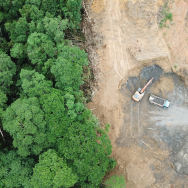Mary Beth Pudup is a steadfast advocate for experiential learning. As director of community studies in the Committee on Environment, Geography and Urbanization, which launched a new eponymous major this fall, Pudup hopes to broaden learning opportunities for undergraduate students in neighborhoods surrounding the University of Chicago.
To wit, she recently helped organize a partnership between CEGU and the Abrams Environmental Law Clinic, a preeminent program in the UChicago Law School promoting sustainable policy. In this practicum, which combines seminars with project-based work, undergraduate students will assist with community-based work of the clinic through local organizations.
Pudup’s efforts fit seamlessly with one of CEGU’s fundamental goals as a new major: to develop a community of scholars, teachers and students dedicated to an equitable planetary future.
“There is a lot of knowledge that exists outside the university that needs to be brought into conversation with what you’re learning in the classroom, and this is the time to do it, when you’re in college,” Pudup said.
Beginning this quarter, the Environmental and Urban Studies (ENST) major, which was recently expanded through its integration with the Geography major, has officially transitioned into a new program housed by CEGU.
Pronounced “sea-goo,” CEGU classes and extracurricular activities confront issues spanning from climate change to environmental justice and biodiversity.
Sabina Shaikh, CEGU’s director of academic programs and undergraduate studies, described the range of disciplines and fields interlaced through the program as integral to the major.
“We consider what we are doing to be really quite urgent, given the environmental emergencies associated with climate change, biodiversity loss and environmental justice,” she said. “I think that’s really what CEGU sets out to tackle.”
The transition impacts all new students who are interested in the major. Current ENST majors will still graduate with the ENST degree designation unless they opt to switch to CEGU.
Geography, earth science and literature are just some of the subjects embedded within the re-organized major. Its aim is to study the Earth’s planetary future by considering social, geophysical, and historic relationships amongst the natural and built environment.
CEGU offers an array of classes. Most are intersectional, fusing fields such as environmental economics, indigenous knowledge and geographical sciences. Assistant Instructional Professor Evan Carver is currently teaching Sustainable Urban Development, a class that focuses on systems such as energy and water, and challenges students to consider how cities can become greener.
“We also spend a lot of time talking about what we even mean by sustainability—whether sustainability is even the best norm, whether it’s even the best concept to be driving things,” Carver said.
In the same vein, students in Pudup’s class, Genealogies of Environmental Organizing and Activism, are exploring environmental thought. She encourages them to examine how ideas enter society and morph from theory into practice, especially through the lens of activism. Pudup described some of the questions she asks students:
“How did there come to be a state interest, and how is that expressed? What does the market offer? How do we monetize nature?” she said. “Just that whole sort of epistemology that environmental economics brings to the natural world.”
The development of CEGU stemmed from the faculty’s recognition that approaches to climate change were limited by existing frameworks of study. Shaikh said the new major will rethink inherited knowledge systems about sustainability, beyond the constraint of traditional scholarship.
“How do we consider these nuanced, broad-scale environmental problems across time and space? We need new ideas, new perspectives, and many different approaches to do that,” she said.
Emma Zhu, a third-year student in the College pursuing an ENST major, said she is enthusiastic about the decision to transition the program into CEGU—particularly because of the professors and the flexibility to double-major.
“Just ‘environmental’ and ‘urban’ is too binary,” she said. “[CEGU] is a more updated, more contemporary way of thinking.”
Students in CEGU can pursue any project concerning the natural and urban environment, on both the local and global scale. The social implications of energy transitions, global climate governance, or local urban environmental policies are just some matters that a CEGU thesis might address.
“However technical these questions might be, they’re also always rooted in particular social structures and political choices, so it’s possible to dig down and uncover often hidden values,” said Assoc. Prof. Fredrik Albritton Jonsson, the 2023-24 Interim Chair for CEGU. For example: “Seemingly rational economic choices are actually hiding a whole set of cultural values.”
The promise of community engagement is one reason Kelli Lynch, a second-year in the College, has committed to the major.
“This school has a large impact on its surrounding community, and not only do I want to understand that impact, but I want to contribute positive change toward the surrounding areas,” Lynch said.
The committee has big plans for the future of CEGU, but they want to hear from students, too.
“Let us know what you think, and what you want,” Pudup said. “I really see us as a space that is open. We’re all navigating this new world together.”
—A version of this story first appeared on the College website.

